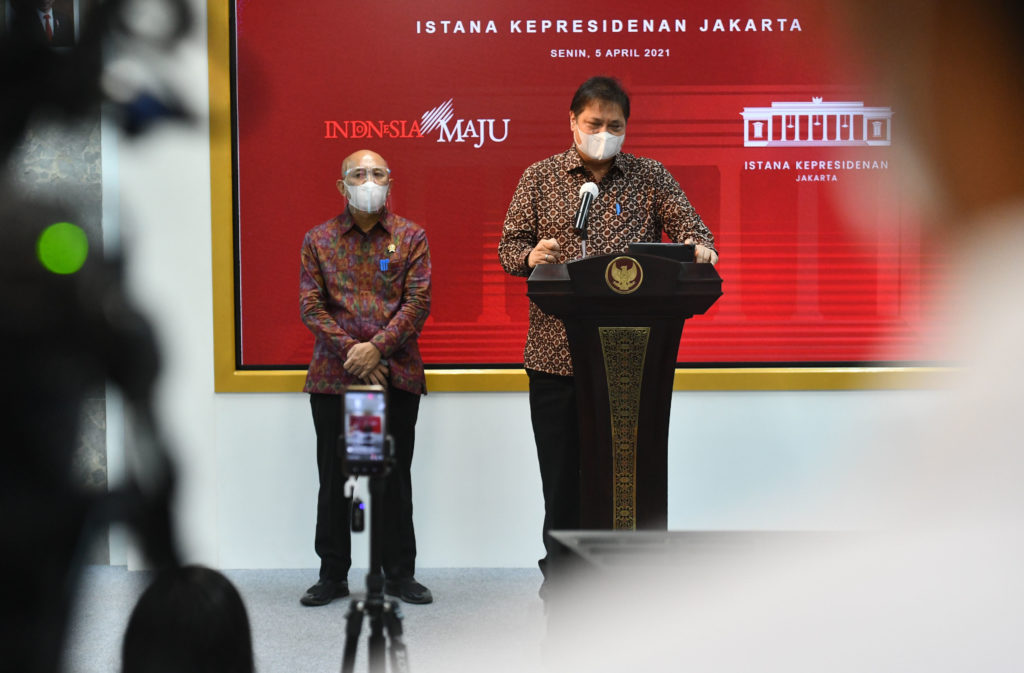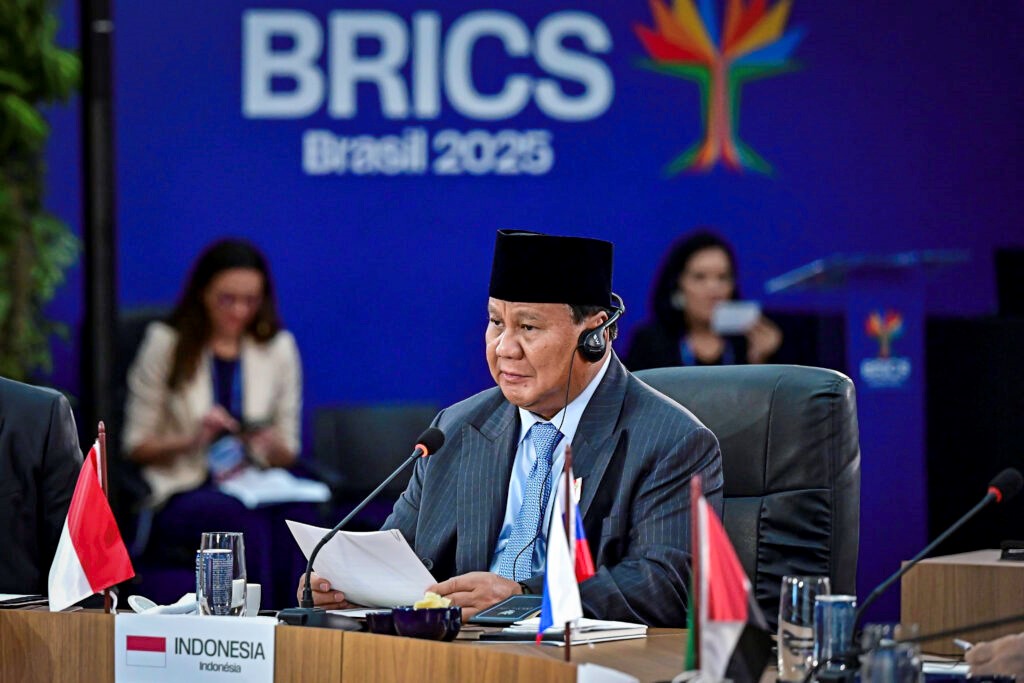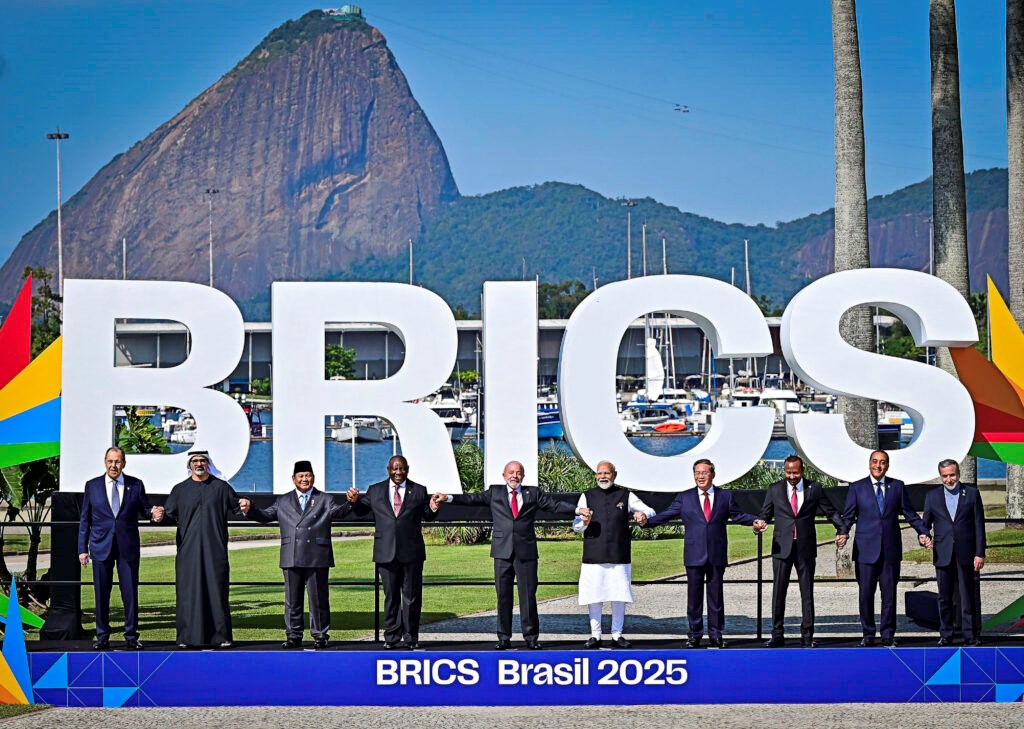Gov’t to Increase No-Collateral Smallholder Business Credit Ceiling to Rp100 Million

Coordinating Minister for Economic Affairs Airlangga Hartarto with Minister of Cooperatives and SMEs delivering press statement after attending a limited meeting, Monday (05/04/2021) afternoon in Jakarta. (Photo: PR of Cabinet Secretary/Rahmat)
In a bid to boost national economic recovery, the Government has made several changes in the regulation on Smallholder Business Credit (KUR) that serves as the primary financial driving force for Micro, Small, and Medium Enterprises (MSMEs) amid the passivity of other credit distribution schemes.
“The Government has made several changes in KUR regulation, one of which is no-collateral KUR scheme. At first, the ceiling was Rp50 million, and now it is Rp100 million,” Coordinating Minister for Economic Affairs Airlangga Hartarto said after meeting with Financing Policy Committee for MSMEs on Monday (03/05).
The meeting was held following President Joko “Jokowi” Widodo’s directive during a limited meeting on an increase in financing credit portion for MSMEs on 5 April.
As of today, credit for MSMEs takes up only 18.8 percent of the total banking credit. The President ordered that the portion is raised gradually to over 30 percent in 2024.
Following the directive, Airlangga pointed out, Financing Policy Committee for MSMEs increased the subsidy for KUR interest rates and changed the regulation on KUR implementation.
“The Government has decided to extend additional KUR interest rate subsidy to three percent for six months, from 1 July 2021 to 31 December 2021,” he said, adding that the Government has provided a budget of Rp4.39 trillion for the extension of additional KUR interest rate subsidy for the period, which makes the budget for the additional subsidy Rp7.84 trillion in total.
Furthermore, Airlangga stated that several changes in KUR regulation that will be in force as of 1 July 2021 are as follows:
- No-collateral KUR scheme changed from a maximum of Rp50 million to a maximum of Rp100 million. The KUR scheme remains the same except for Small KUR that has additional no-collateral KUR amount up to Rp100 million.
- Recepients of Small KUR can register as a participant of BPJS Ketenagakerjaan (Workers Social Security Provider Body) as a follow up of Instruction of President of the Republic of Indonesia Number 2 of 2021 on Implementation Optimization of Workers Social Security.
- Regulations on KUR and other credit recipients.
- Additional provisions for Special KUR for MSME industry or other productive sectors’ commodities that can be developed into Special KUR. Based on the previous provisions, Special KUR is allocated only for commodities of public plantation, husbandry, and fisheries.
Airlangga added that the Government has also decided to rise the 2021 KUR ceiling from Rp253 trillion to Rp285 trillion.
“The rise of the ceiling is a response to MSME players’ high enthusiasm of KUR with low interest rate and hope for MSME recovery,” he said.
In general, the realization of KUR distribution from January 2021 to 29 April 2021 has reached Rp82.56 trillion or 32.63 percent of the target in 2021, which is Rp253 trillion. The KUR was granted to 2.28 million debtors, so the total outstanding KUR is Rp252.92 trillion with a non-performing loan rate of 0.71 percent.
Citing the data from Credit Program Information System as of 29 April 2021, the realization of KUR policy in the COVID-19 pandemic is as follows:
- Additional KUR interest rate subsidy as of 31 December 2020 has been given to 7.02 million debtors with a debit balance of Rp186.5 trillion.
- Principal installment payment delay as of 29 April 2021 has been given to 1.76 million debtors with a debit balance of Rp70.53 trillion.
- KUR relaxation as of 29 April 2021 in the form of payment extension has been given to 1.51 million debtors with a debit balance of Rp47.51 trillion, while relaxation in the form of additional KUR ceiling limit has been given to 16 debtors with a debit balance of Rp2.49 billion. (PR of Coordinating Ministry for Economic Affairs/UN) (DH/EP)
The official website of Coordinating Ministry for Economic Affairs can be accessed through this link.








